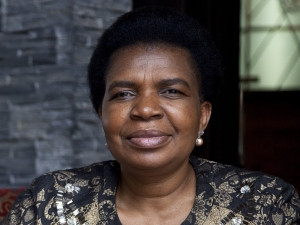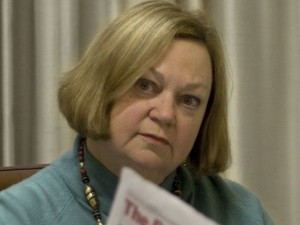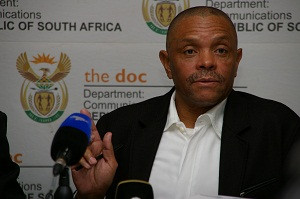
On the face of it, SAs communications minister, Dina Pule, has not been found guilty of any wrongdoing, despite a sustained attack on her that has lasted longer than half of her 16-month tenure as the head of one of government's most important ministries.
But perhaps that is of little comfort to the under-fire minister, who is increasingly seen as fighting for her political life, as the allegations that have surfaced against her some nine months ago reach a crescendo and threaten to drown out the voices of even her most ardent supporters.
Currently, Pule is awaiting the outcome of the public protector's probe into allegations of a conflict of interest, stemming from her alleged romantic relationship with businessman Phosane Mngqibisa. At the same time, Parliament's ethics committee is also gearing up to investigate Pule's involvement with Mngqibisa, and allegations that their romantic relationship resulted in a conflict of interest with Pule's involvement in last year's ICT Indaba, leading to financial irregularities involving sponsors' money for the event.
In recent weeks, the speculation surrounding Pule's personal life have spilt over into the upper echelons of government, with media reports alleging that Mngqibisa, in essence, is in charge of the Department of Communications (DOC) and also has undue influence over government's process to select manufacturers for the country's digital TV set-top boxes.
The lead antagonist in the Pule saga seems to be the Sunday Times newspaper, which initially reported the ICT Indaba allegations and has since stepped up its campaign against the minister, which recently culminated in the paper petitioning president Jacob Zuma to dismiss Pule, with a front page headline that read: "Fire her now, Mr President".
In the above-mentioned article, the Sunday Times, citing an internal audit, reported Mngqibisa "got his friends and relatives onto the boards of the Post Office, Sentech, the Universal Services and Access Agency, and the SABC, with the full knowledge of Pule".
While Pule's camp has objected to the fact that the Sunday paper has now resorted to editorialising and trying to influence government under the guise of reporting news, through mostly unsubstantiated allegations, even the most objective observers are starting to question whether Pule's continued tenure as minister of communications remains tenable.
Political agenda?
The Sunday Times' allegations - starting with the ICT Indaba and culminating in the accusations that Mngqibisa now wields undue influence in government matters - have gone as yet largely untested and are often based on statements by unnamed sources. The publication's team of investigative journalists has, on numerous occasions, stated that it is in possession of evidence to back up its claims, but has to date not presented any solid proof to substantiate its statements.
Instead, when questioned about the veracity of its reporting on the Pule matter, the paper attacked those who sought to establish what proof it may be sitting on, including fellow journalists and publications, accusing them of siding with Pule and insinuating these parties have a vested interest in protecting the minister.

The intensity of the Sunday Times' attack on Pule has led to some - including the minister herself - questioning whose agenda the Sunday Times is, wittingly or not, driving.
Pule recently revealed, in an interview with ITWeb, she suspects that the "sustained smear campaign" against her is an "agenda that is most likely financially- and politically-motivated, and which could well include a political play for leadership of the Department of Communications".
Here is where Pule says the answer lies to the question: "Why me?"
The DOC is one of the most important ministries in government, overseeing a historically tricky, but always extremely lucrative, telecoms space, whose development and expansion has far-reaching consequences for South African consumers and businesses alike. The telecoms sector has produced a few billionaires, many millionaires and has been a very fertile ground for entrepreneurs who are ready to take advantage of policy change, as government lumbers on towards liberalisation of the sector.
Currently, the DOC is about to make some very key decisions that could drastically influence the course of the telecoms industry in this country. Not least of all is Telkom, which urgently needs a strategic plan to determine its future direction.
While the market recently welcomed the appointment of Sipho Maseko and Dr Brian Armstrong as CEO and COO, respectively, analysts were united in slamming government as the biggest obstacle in the growth path of the ailing fixed-line operator. Government, as the largest single shareholder, holds a 39.7% direct stake in Telkom and another 10.6% indirect interest though the state-owned Public Investment Corporation, and has been accused of constantly interfering with the running of the company.
The market came down hard on Pule last year, when government last June pulled the plug on a potential deal between Telkom and Korea-based KT Corporation, which would have seen Telkom issue 20% more shares in return for an initial R3.3 billion injection.
At the time, Pule was accused of backing out of the deal as it would not have suited government and its desire to retain control of the company. However, Pule claims her decision was based purely on financial considerations, as the sudden drop in Telkom's share price, as the deal was about to be inked, meant that some R1.7 billion would have been wiped off the deal's value.
A market observer, who wishes to remain unnamed, says the disinformation out there lies in the numbers. "The media are still touting the deal as R3.3 billion when, in fact, the final purchase offer was R2.6 billion.
"Telkom shed almost 40% share value in the year the deal with Korea Telecom was put together. Someone was about to make a killing in the Telkom KT deal and it wasn't Telkom, or the other minority shareholders, that's for sure."
The source suggests that perhaps the JSE should start looking into whom, if anyone, was picking up discounted Telkom shares during the period the deal with KT was being put together, until the time the final offer was made.
"If ever there was a case for regulatory oversight by the JSE on a proposed deal, the proposed Telkom KT deal is one. There are still many who want to see this, or a deal like it, go through. The question, if it does and if they do, is who gets it? Whatever the outcome, there's a potential R2.6 billion deal out there and Pule is in the crosshairs."
There seems to be so much faith placed in the rhetoric of 'universal access, information society, and knowledge economy', while there is zero accountability for failing to move towards those laudable goals.
Subsequently to cancelling the deal, which was considered a vital lifeline for Telkom at the time, the DOC announced it would report back to Cabinet with options for a turnaround strategy for Telkom, within three months of the cancelled deal, but this has been delayed and has yet to materialise.
However, some have already expressed cynicism over a strategic turnaround plan devised by government, saying the plan would no doubt steer Telkom in a direction that will benefit government.
Other key decisions that Pule is expected to make in the near future is scarce spectrum allocation and the manufacturing plan for set-top boxes that will enable the country's migration to digital TV. Both issues can lead to lucrative commercial opportunities and both have already been heavily politicised.
Even former journalist and political commentator Max du Preez recently weighed in on the debate, in reaction to the Sunday Times' latest salve calling for Pule's axing.
Writing in the Cape Times, 26 March 2013, in an opinion piece headed "It's a disinformation scandal as journalists help spread the fog of rumour", Du Preez states: "It pains me, as a former newspaperman, to see how reporters nowadays allow themselves to be used to fight politicians' dirty power battles by spreading innuendo and rumour about opponents. Ironically, this reliance on the media mostly comes from the ANC, a party whose commitment to free speech is at best suspect - some of its top leaders have called the media the enemy of democracy and of the people."
Wrong place, wrong time?
Thus, with the culmination of so many sensitive and politically charged issues facing the minister, Pule can perhaps be described as serving as communications minister in the wrong place and at the wrong time.
On the surface, her performance as minister and other alleged sins are not what set her apart from some of her predecessors. For instance, former SANDF general Siphiwe Nyanda, who served as communications minister for 18 months, until October 2010, saw his fair share of controversy.
Within months of his appointment, Nyanda made headlines with the purchase of two BMWs - at R1.1 million each - as his ministerial vehicles. While much attention was focused on his extravagant spending, both the SABC and Sentech floundered during his brief stint as minister.
A public tussle between Nyanda and his director-general, Mamodupi Mohlala, saw her controversially fired on 23 July 2010, with the minister citing a breakdown in trust. However, it was at the time that Mohlala had reported tender irregularities, amounting to R70 million to the police, and had called for disciplinary action against several senior civil servants.
Nyanda can also largely be blamed for delaying SA's digital TV migration process and wasting millions of rands investigating an alternative digital TV standard for the country. In April 2010, the DOC decided to review the decision to implement the European DVB-T standard, introducing a Brazilian adaptation of the Japanese ISDB-T standard as a possible alternative.
This left broadcasters and set-top box manufacturers frustrated and angry, since many are chomping at the bit to get digital TV rolling. At the time, Altech CEO Craig Venter threatened to sue the state if it went with ISDB-T, arguing that the private sector had spent about R700 million gearing up for migration on the DVB-T standard, which is most widely used across the world.
In 2010, public protector Thuli Madonsela was requested to investigate Nyanda's alleged conflict of interest when heading up the communications portfolio. Julie Killian, of Cope, laid a complaint on 19 March, after Nyanda's company, General Nyanda Security Risk Advisory Services, was awarded a R55 million contract by axed and then reinstated Transnet Freight Rail CEO Siyabonga Gama.

Nyanda came out in support of Gama during his legal battles with the transport utility, leading to a public chastisement from Zuma. A second complaint was laid by the Democratic Alliance (DA) relating to a tender that was allegedly irregularly issued by the Gauteng Department of Transport to a company linked to Nyanda (Abalozi Security Risk Advisory Services), before he became communications minister, and his continued benefit from the contract.
In a report released in August 2010, the public protector found Nyanda had not violated the executive members' Code of Ethics, or the corresponding provisions of the Code of Ethics with the awarding of a contract to Abalozi Security Risk Advisory Services, of which Nyanda is a former director, by the Gauteng Department of Public Transport, Roads and Works (GDTRW) for security services.
While there was no shortage of controversy surrounding Nyanda, he did not suffer the same intensity of attack that Pule is being subjected to. Despite the numerous allegations of political impropriety, Nyanda was quietly moved to the position of parliamentary counsellor to Zuma, a position he still holds.
'She must go'
Whatever forces may or may not be at play behind the rising tide against Pule, it is unsurprising that opposition political factions are joining - perhaps opportunistically - in the attack. The DA has been very vocal about the removal of Pule, leaning heavily on the Sunday Times' allegations to call for her sacking.
"The DA reiterates its call for president Zuma to fire minister of communication, Dina Pule, without any further delay. The latest revelations in the Sunday Times today that minister Pule's boyfriend, Phosane Mngqibisa, had been able to secure top jobs for friends and relatives at the Post Office, Sentech, USAASA and the SABC, with the full knowledge of minister Pule, is further evidence of the complete mismanagement of the Department of Communications under her watch," said DA shadow minister of communications Marian Shinn in a statement last month.
Meanwhile, Cope has also joined in asking for Pule's head, urging Zuma to prove his commitment to fight corruption by removing the communications minister. The party says Zuma cannot ignore the prima facie evidence.
Some telecoms sector analysts have also called for her removal, despite her guilt or innocence, arguing that the sector has lost faith in Pule, making her continued tenure as communications minister untenable.
Independent commentator Paul Booth argues that too much negative press has been associated with Pule. "She should go. Whether [the allegations are] true or not, the longer she stays, the worse it gets. Government needs sensible goals and strategy [for telecoms], but nothing new is happening at the moment."
Booth concedes that a political agenda is probably at play behind the onslaught on Pule, but says she is now perceived as totally corrupt. "And there is too much smoke, anyway. There must definitely be some fire."
He argues that the perception of Pule and the DOC is causing a reluctance to be entrepreneurial among the private sector, and adds that the communications ministry is currently lacking stability.
Adrian Schofield, ICT industry veteran and manager of the Applied Research Unit at the Joburg Centre for Software Engineering, marks Pule down on her performance as minister, saying she is a completely inappropriate appointment to what is one of the most important portfolios in government.
"Regardless of her guilt or innocence, in respect of the allegations about her conduct, she has abysmally failed to advance the cause of ICTs in this country by one iota."
Whether [the allegations are] true or not, the longer she stays, the worse it gets.
Schofield says there are many issues clouding the realities of the long-standing poor performance of the ministry and DOC.
"The conflicts between the demands of the portfolio organisations (SABC, Telkom, SAPO, Sentech, et al), the 'control' policies of the ANC, the regulatory issues, the industry heavyweights and the needs of the people have resulted in inertia instead of action."
He says there is almost no capacity within the department to advise the minister effectively and little incentive for policy to be turned into implementation, without effective management in place.
"There seems to be so much faith placed in the rhetoric of 'universal access, information society, and knowledge economy', while there is zero accountability for failing to move towards those laudable goals.
"I don't particularly blame Dina Pule for the failures. Her self-serving behaviour is typical of too many ANC politicians who seem more concerned with their rights than with their responsibilities. There is no sense of duty, only of privilege.
"Every bit as much as ineptness and corruption in defence, home affairs, health and education (to name a few) have reduced South Africa to 'also ran' status, so the disastrous performance of [the DOC] has denied South Africans access to affordable 21st century technology, prevented foreign investment in the sector and dragged us down the rankings.
"Successive ministers have missed every opportunity to change this and Pule is no different. By most standards, her position is definitely untenable, but by ANC standards, that seems to be par for the course."
It is over?
Pule will face Parliament's ethics committee on 22 April, and five days have been set aside to probe her involvement with Mngqibisa. A report will be compiled after the hearing, and the committee can recommend that further steps be taken.
In the meantime, the public protector is also expected to rule imminently about whether a relationship exists between the two and whether this had led to a conflict of interest pertaining to the ICT Indaba.
Even if Pule is exonerated and a political plot is revealed behind the media-driven attack on her, this is unlikely to restore the telecoms sector's faith in her.
Thus, if this was a political assassination, it seems to have succeeded. Pule's continued tenure as communications minister seems untenable.
Additional reporting by Nicola Mawson.
Share